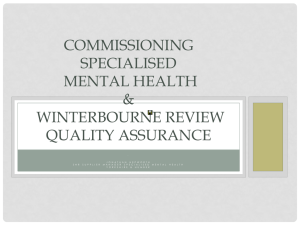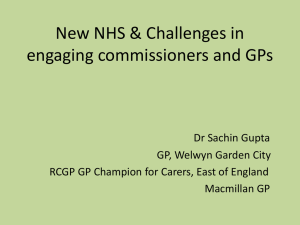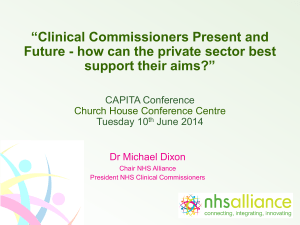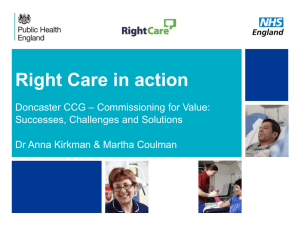Clinical Commissioning- A Guide for the Voluntary and Community
advertisement
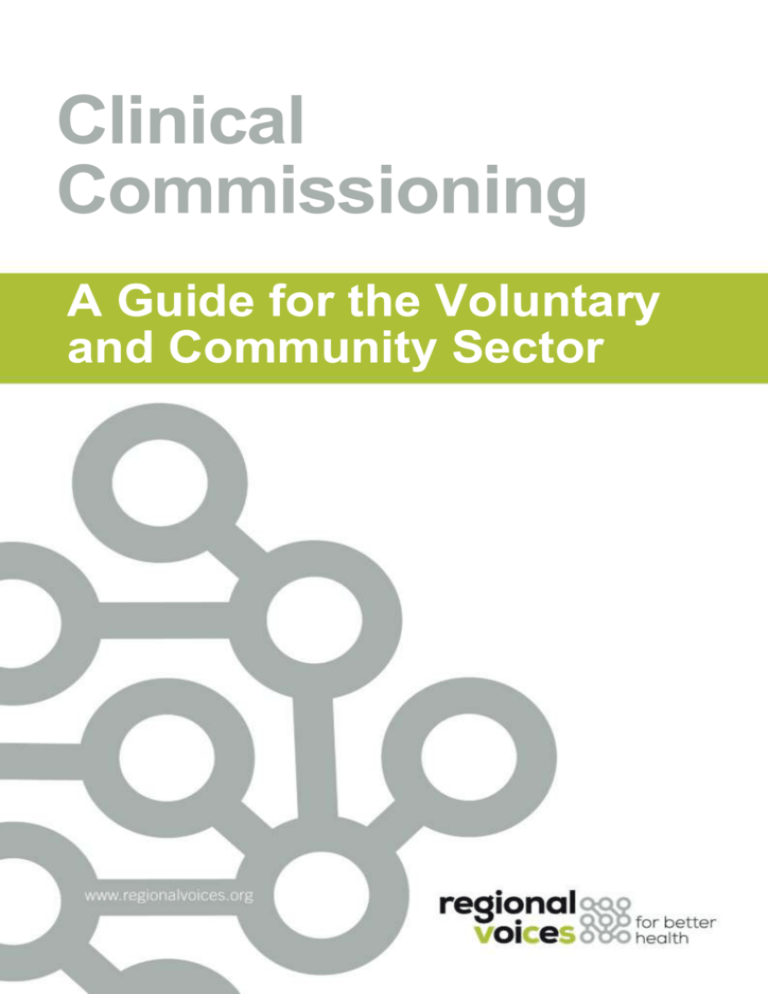
Clinical Commissioning A Guide for the Voluntary and Community Sector 1 Briefing Aim: Summarise the key changes in clinical commissioning brought about through the Health and Social Care Act 2012. Highlight different ways for the voluntary and community sector to engage with clinical commissioners, including commissioning support structures. Identify issues and opportunities for voluntary and community organisations in the new clinical commissioning landscape. Jo Whaley, July 2013 Introduction Since the introduction of the Health and Social Care Act, 2012, the NHS has undergone a significant restructure which abolished strategic health authorities (SHAs) at regional level and primary care trusts (PCTs) at local level. In their place are now clinical commissioning groups (CCGs) which will make commissioning decisions in health for the local population, and a national commissioning board, NHS England, which commissions GPs, oversees the CCGs and commissions some low volume services- specialised commissioning. The principle behind these changes is to ensure clinical expertise lies at the heart of the commissioning process and to place decision making as close to patients as possible. It should be noted that CCGs are developing locally to suit local needs and priorities. There are therefore differences in how the changes in commissioning are being implemented in different parts of the country. This document aims to provide a quick reference to developments in health commissioning. Changes within other areas of health and care (including public health, health and wellbeing boards and Healthwatch) are covered in other publications which can be found on www.regionalvoices.org/developments. Clinical Commissioning Groups At local level, groups of GPs and other key healthcare professionals work together as clinical commissioning groups (CCGs) and are responsible for the majority of the healthcare budget in their area to plan and pay for services for the local population. CCGs decided themselves what geography they will cover and therefore in some local authority areas there are now more than one CCG. All GP practices within a geographical area are part of the CCG for that locality. Each CCG has a governing board which must include: GPs registered nurse (from non commissioned service) doctor who is a secondary care specialist (from non commissioned service) lay member to champion patient and public involvement lay member to oversee governance, including audit, remuneration and managing conflicts of interest There are now 211 CCGs of varying size in terms of staff numbers and population coverage (100 fold variation reported in HSJ). It should be noted that all providers of a personal medical services contract (the NHS contract held with GPs) have to be a member of a CCG in order to continue working within the NHS. CCGs are also statutory members of their health and wellbeing 2 boards and are required to use the joint strategic needs assessment (JSNA) and joint health and wellbeing strategy developed with the HWB when drawing up their commissioning plans. This is a major difference in how the NHS budget is spent, however the reality on the ground for the majority of clinicians is not significantly different on a day to day basis and it tends to be a small group of clinicians within each CCG leading the developments. Key considerations for the VCS: Across England there are currently 211 CCGs. Many do not follow the local authority boundaries, so knowing who to influence may be a challenge. The links below give more information about the size, budget and location of all CCGs. Organisations need to make connections with new commissioners, who may not know about their work and how they support communities/patients (see Appendix A for tips to make practical links with CCGs). It is worth noting that CCGs do still have the power to award grants to the voluntary organisations, rather than always going through competitive tendering processes and/or requiring formal contracts for services to be put in place. Regional Voices is working with NHS England to promote use of grants. CCGs have a duty to involve patients and the public in commissioning decisions- which the VCS is well placed to support. An offer could be made to support CCGs work with harder to reach communities. In smaller CCGs, it is likely that the commissioning support unit will assist with this duty and therefore a useful contact to make. In many areas the voluntary and community sector has found effective ways to engage with CCGs, whilst in others, the sector has struggled to engage effectively. The Department of Health is working with NAVCA, Social Enterprise UK and the Institution for Voluntary Action Research with a range of pilot sites to maximise the potential of collaboration between CCGs and the sector to improve health in local communities and develop support materials (http://www.navca.org.uk/healthpartnerships) Useful links: Where the CCGs are http://www.england.nhs.uk/resources/ccg-maps/ Regional Voices has produced a guide to the VCS to provide an easy to understand resource for VCS organisations to use with their CCG and health and wellbeing board http://www.regionalvoices.org/vs-wellbeing. A Healthier Perspective- a very practical toolkit to support commissioners and the voluntary sector understand how they can work together in commissioning health services http://www.raise-learning.org.uk/ Towards More Effective Commissioning- showcases examples of commissioners and VCOs working creatively to co-produce solutions to entrenched health difficulties http://www.vsnw.org.uk/activities/health/commissioningproject The Interim CCG Assurance Framework can be used to identify how well CCGs are performing in their role as the commissioners of local health services: http://www.england.nhs.uk/wpcontent/uploads/2013/05/ccg-af.pdf Article which describes the variation in size of CCGs http://www.hsj.co.uk/news/workforce/revealed-the-100-fold-variation-in-ccg-workforcesize/5059624.article 3 Any Qualified Provider (AQP) As part of the agenda to increase patient choice, clinical commissioners may identify specific services which they will open up to all providers (including private and not-for-profit organisations) which can demonstrate that they meet agreed quality and service standards. The organisations which achieve ‘Qualified Provider’ status will receive a ‘fixed price’ for providing services when selected by the patient. Therefore, when a patient is referred (usually by their GP) for a particular health service, they should be able to choose from a list of qualified providers who meet NHS quality requirements and price. Key considerations for the VCS: The move to AQP could provide opportunities for many VCS providers, including smaller providers, if the application to meet AQP is not too onerous in opening up their services to those who might not otherwise have accessed them. For others, the financial uncertainty surrounding AQP, where patients may or may not choose your service, may be problematic in comparison with block contracting. VCOs may also need to devote more resources to marketing their services as the provider market becomes more open. Useful links: AQP Resource Centre http://supply2health.nhs.uk/AQPResourceCentre/Pages/AQPHome.aspx Overseeing and supporting CCGs NHS England NHS England (the commissioning board) is an independent arms length body organisation, accountable to the Secretary of State for Health for delivery against the NHS Outcomes Framework, theoretically outside of political control. It is currently creating a business plan over a 10-year period creating strategic direction to the NHS and is engaging with all stakeholders in the NHS with its “The NHS Belongs to the People- Call to Action”. NHS England is based in Leeds and its quarterly meetings are open to the public. Sir David Nicholson is currently the Chief Executive of NHS England. NHS England is responsible for designing the commissioning landscape including agreeing how CCGs are authorised and run, holding them to account under the NHS outcomes framework and ensuring they spend their budgets properly. It also currently hosts and provides support to commissioning support units. NHS England also undertakes commissioning for some specialised services such as transplants and health services in prisons and directly commissions primary care including GP services. In addition, NHS England: supports improvements in quality and outcomes increases public and patient involvement in choice, championing the interests of patients rather than of providers. allocates and accounts for NHS resources. leads on promoting equality and reducing health inequalities Specialised Services Commissioning Clinical reference groups cover the full range of specialised services and are responsible for providing NHS England with clinical advice regarding these directly commissioned services. The CRGs are made up of clinicians, commissioners, public health experts and patients and carers, and are responsible for the delivery of key ‘products’ such as service specifications and 4 commissioning policies, which enable NHS England to commission services from specialist providers through the contracting arrangements overseen by its Area Teams. Support in the Regions Following the footprints of the previous strategic health authority clusters there are four regional offices of NHS England: (1) NHS North of England (North East, North West and Yorkshire and Humber) (2) NHS South of England (South West, South Central and South East Coast) (3) NHS Midlands and East (West Midlands, East Midlands and East of England) (4) NHS London At a more local level there are 27 area teams performing NHS England functions. Key considerations for the VCS: Part of the ongoing criteria for CCG authorisation is whether they have good links with the VCS. Where this is not the case, the VCS should seek to influence and could speak to NHS England to support change Regional Voices is working with NHS England, to support commissioners (at local and national levels) to develop processes that support the work of small to medium sized voluntary organisations. This includes work to ensure CCGs are aware of their grantmaking powers and how to use them. VCOs with a particular clinical expertise may wish to be involved with NHS England's clinical reference groups which advise on commissioning of specialised services. Useful links: NHS England website http://www.england.nhs.uk/ Specialised services commissioning http://www.england.nhs.uk/ourwork/d-com/spec-serv/ NHS England's Clinical Reference Groups http://www.england.nhs.uk/npc-crg/ Clinical Senates and Networks NHS England hosts twelve regional teams to provide clinical support for health services across the country, in the form of: (1) Strategic clinical networks which advise on single areas of care and whole care pathways. It is envisaged that local groupings of these networks will form. Initial thematic groupings are: Cancer Cardiovascular Women and children Mental health, neurological conditions and dementia (2) Clinical senates, in each of 12 areas around the country, which provide multi-professional advice on local commissioning plans- particularly on topics where GPs may not have specialised knowledge. They aim to give multi-disciplinary clinical leadership (3) Operational delivery networks which focus on coordinating patient pathways between providers over a wide geographic area to ensure access to specialist support. Initial themes cover: neonatal intensive care, adult critical care, burns, trauma 5 Key considerations for the VCS: The strategic clinical networks, in particular, will be key for organisations working around specific clinical areas. The regional public and patient involvement leads at NHS England, which your regional Health Coordinator can signpost, will be a useful route in: www.regionalvoices.org/about. Useful links: Strategic clinical networks, the single operating framework: http://www.england.nhs.uk/wpcontent/uploads/2012/11/scn-sof.pdf The Way Forward: Operational Delivery Networks http://www.england.nhs.uk/2012/12/21/odn/ The Way Forward: Clinical Senates. http://www.england.nhs.uk/2013/01/25/clinical-senates/ Commissioning Support Services Commissioning support units (CSUs) have been designed to support CCGs, retaining some of the commissioning expertise from primary care trusts; they aim to offer locally-sensitive, practical support for CCGs. Whilst CCGs retain legal accountability and responsibility for meeting their statutory functions (their commissioning decisions cannot be delegated), the commissioning support unit can support them in carrying out commissioning functions, like leading change and service redesign, as well as actual commissioning functions, such as procurement, contract negotiation and monitoring and information analysis. There are currently 18 CSUs across the country, many of which have evolved from primary care trusts, set up as social enterprises. CSUs are currently hosted by NHS England, but from 2016 they are expected to become freestanding and compete for business. The geographic footprint of CSUs are not straightforward, for example “Staffordshire and Lancashire CSU”. It is likely that there will be other mergers over time. Key considerations for the VCS: CSUs will be useful links for VCS organisations working in health, to support the development of sustainable and effective local relationships. Some CSUs will be piloting support for CCGS to garner individual and collective participation in commissioning (for which the VCS is a key partner) It will be particularly important for local infrastructure organisations to develop and maintain relationships with CSUs to promote engagement with the VCS Useful links: Map of current commissioning support units http://samathieson.com/sa-mathieson/the-csu-zymerging-morphing-map-of-nhs-commissioning-support-units/ List of current CSUs and names of Managing Directors: http://www.england.nhs.uk/appointments/csu/ Appendix A: Ideas on how to develop your relationships with CCGs: The sector must work together to offer co-ordinated engagement with CCGs; they may not want to engage with lots of individual organisations. It is therefore recommended that you contact your local council for voluntary service (CVS) or equivalent in the first instance to understand what coordinated work is already taking place. Decide who you want to develop a relationship with; is it CCG board members or commissioning staff? If CCGs have assigned leads for aspects of commissioning, it may be easier to engage those leads on their specialism rather than the Chief Executive. Or is it the public health team in the local authority which will be more useful for your 6 organisation? (See Overview of public health for the VCS: http://www.regionalvoices.org/sites/default/files/library/Publichealthoverview_july13.doc) Unless you already have a relationship with your local GPs, assume they know very little about your organisation, the service you provide or the specific issue of the community you serve. Be clear about your clients’ needs and how your organisation meets those needs. Use any relationships you already have in the health sector as CCGs will already have relationships with many health professionals. The more you can work with other organisations to demonstrate how many people or organisations share your concerns and how well your ideas fit in with the priorities of the statutory organisations, the more notice CCGs are likely to take of you. If you want to influence service provision, the more you can demonstrate beneficial outcomes and value for money the better, that includes how many people receive, or could benefit from, the service, what difference it makes to them and how much it will cost and save. When meeting people, spend time preparing the groundwork to ensure you create the right impression. Think about your message and make it as clear and relevant as possible. To do this you should: o find out CCG priorities so you can tailor your message to them o develop your 30 second and 5 minute pitches o summarise your points on 1 side of A4 Further Information Other briefings and resources for the VCS from Regional Voices about the transition in health and care can be found on www.regionalvoices.org/changes Regional Who's Who in Health and Care Guides: www.regionalvoices.org/whoswho To find out more about Regional Voices' work in health, wellbeing and care go to http://www.regionalvoices.org/developments Follow us on twitter @regionalvoice Regional Voices connects voluntary and community organisations with government, through nine regional networks, to inform and influence policy at local, regional and national levels. Regional Voices is a Strategic Partner to the Department of Health, NHS England and Public Health England. If you require this information in an alternative format or further information email or call: contact@regionalvoices.org 0113 394 2300 7

